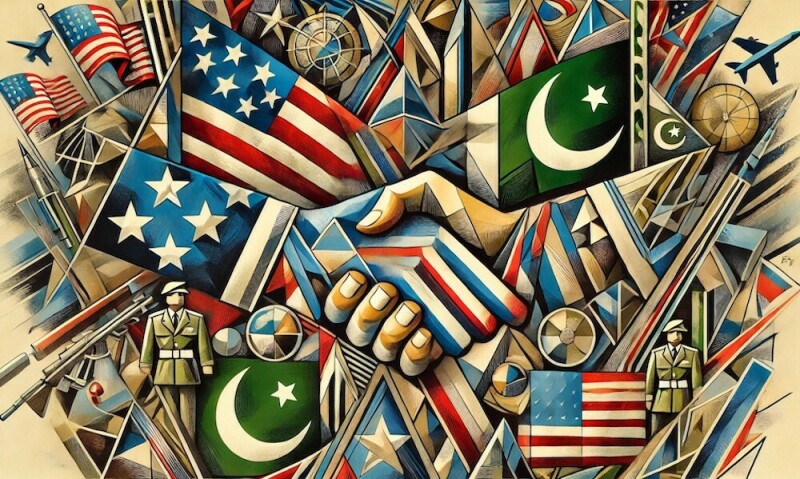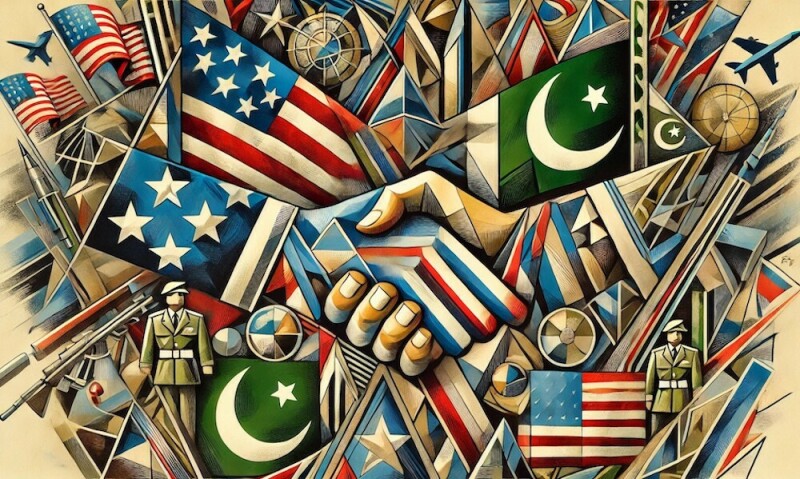
[ad_1]

As the US presidential race unfolds, Pakistan watches closely — yet the outcome is unlikely to stray from the well-worn paths of pragmatism.
The US presidential election is just days away, and many within Pakistan are keeping a close eye on the race for obvious reasons. The elections have also led to an increased debate, both within Pakistan and the American-Pakistani diaspora, about what each candidate would mean for Pakistan, especially the future of former prime minister Imran Khan, who is currently in jail.
Much of this debate, however, has failed to properly take into account the structural drivers of US policy towards Pakistan, and the limited level of interest Washington has when it comes to Pakistan and its political economy.
From Washington’s perspective, the US exit from Afghanistan and Washington’s deepening relationship with India have reduced the relative importance of Pakistan. Pakistan’s own deepening relationship with China has also led many national security actors in Washington — across both parties — to believe that it is futile to pursue a strategy that seeks to prevent Pakistan from falling into China’s geopolitical orbit.
While this is not a unanimous view, it is a perspective shared across party lines. This helps explain why, for example, Washington recently placed sanctions on companies supplying Pakistan’s ballistic missile programme.
Strategic distance
The transition in the bilateral relationship began in the Obama administration, but accelerated during the Trump presidency. The 2017 National Security Strategy offers evidence of this shift, as the document primarily focused on the fact that Washington was facing “threats from transnational terrorists and militants operating from within Pakistan.” In addition, the strategy highlighted that Pakistan needed to “intensify its counterterrorism efforts” and demonstrate that “it is a responsible steward of its nuclear assets.”
The Biden administration’s 2022 National Security Strategy did not even mention Pakistan and the broader thrust of the document reveals that Washington has in many ways moved on from the country.
The State Department has, meanwhile, outlined a narrow set of core objectives when it comes to diplomatic engagement with Islamabad, with the first goal being focused on countering terrorism and violent extremism, and the second priority being the advancement of regional stability, with a specific focus on the fact that “Pakistan’s military capabilities do not pose a threat to the US or our allies and partners.”
This broad bipartisan consensus on priority topics means that the primary interlocutor for Washington remains the Pakistani military, given the fact that it plays an outsized role in terms of counter-terror policy as well as overall nuclear strategy, including Pakistan’s missile development programme.
Recent events in the region are also likely to necessitate greater US-Pakistan counter terror cooperation. This includes the death of two navy SEALs during a naval operation where Pakistani citizens were caught transporting weapons for Houthis in Yemen, including “critical components for medium range ballistic missiles,” and the growing capacity of the Islamic State of Iraq and al-Sham (ISIS) in Afghanistan, which recently tried to “conduct an election day terrorist attack” in the US through an Afghan citizen living in Oklahoma.
The base case scenario therefore is that the outcome of the presidential election in the US is unlikely to lead to a major shift in the bilateral relationship. And in the event that there is a shift, these are likely to be caused by Washington’s near-term national security priorities, which are likely to prioritise deeper engagement with Pakistan’s military establishment.
At the same time, however, the outcome of the election will impact the bilateral relationship on the margins, given the differing strategic priorities that each candidate has laid out on the campaign trail.
Harris vs Trump
Should Kamala Harris ascend to the presidency, one can anticipate a degree of continuity from the Biden administration’s approach to Pakistan. However, given Harris’ personal track record as a prosecutor and her past advocacy for human rights and environmental issues, her administration may place greater emphasis on these aspects within the bilateral framework.
Given the turmoil in the broader Middle East, a Harris administration would try to pursue a diplomacy-first approach when it comes to Iran. While exogenous geopolitical factors could create headwinds for this approach, positive progress in diplomatic engagements between Washington and Tehran could be a net positive development; a breakthrough on sanctions could also open up energy access for Islamabad, a growing need given broader energy security issues that the country faces.
Finally, the Democrats are much more committed to investments focused on climate resiliency and adaptation. Given the disastrous impacts climate change is having on Pakistan, a Harris administration would likely further deepen engagement with Pakistan on this topic and be more open to financing that helps Pakistan deal with a climate emergency.
On the flipside, a Donald Trump administration could introduce some changes to the bilateral relationship, primarily due to Trump’s persona. While some expect him to pursue a hardline with Pakistan’s military when it comes to democracy, rule of law, and the incarceration of Imran Khan, the fact is that Trump loves strongmen, especially those in uniform.
Consequently, while Trump may say a few words here and there about Pakistani democracy, he is unlikely to do anything of substance on this topic. In fact, Trump’s lack of commitment to democracy and rule of law could embolden authoritarian elements around the world, including in Pakistan.
Trump’s scepticism on climate change may also hinder Pakistan’s efforts to secure additional financial support for climate adaptation and resilience from Washington. His trade and tariff policy could also create headwinds for Pakistani exports, given that the US is the largest bilateral export destination for the country. He is also likely to pursue a tougher policy towards China, which could create challenges for Islamabad especially as it relates to the scale and nature of Chinese debt.
Trump also has indicated that he would pursue a more confrontational policy towards Iran, and may also back Israel’s desire to hit Tehran’s nuclear programme. This could exacerbate regional instability, directly affecting Pakistan’s security environment, especially at home. A broader conflict in the Middle East could also lead to greater sectarian tensions in Pakistan, and potentially complicate Islamabad’s counter terror priorities due to increased recruitment efforts by Iran-backed proxies operating in the region.
In such a situation, Trump’s transactional approach to foreign policy would allow the Pakistani military to make certain concessions to Washington when it comes to key US national security priorities, and in return, have the US turn a blind eye to democratic backsliding and the erosion of the rule of law in Pakistan.
Pakistan’s peripheral role
At the end of the day, Pakistan is unlikely to emerge as a top-tier priority for either administration in the near-term. Given the trajectory of US strategic and foreign policy interests, it is almost certain that Pakistan will continue to be viewed through the China, India, and Iran prisms, and the US engagement with Pakistan will remain narrowly focused on core national security priorities.
However, choices made by Pakistan, especially as they relate to normalising relations with India, could add a newer, more positive dynamic to the US-Pakistan relationship. In addition, a sustained commitment to curbing transnational terror groups — or a worsening of the regional counter-terror picture — could increase US engagement with Pakistan.
If Pakistan continues to deepen its economic and security ties with Saudi Arabia and the United Arab Emirates, Washington may also engage more positively given the broader economic and security architecture that it is seeking to develop in the region. Sustained economic reforms that mobilise greater non-Chinese investment flows could also create new avenues for engagement, especially in the context of shifting global supply-chains.
However, the primary actor responsible for making these choices is Pakistan’s military establishment, which means that the army is likely to continue to be the primary interlocutor with Washington. So those who believe that a Trump or Harris administration will lead to a substantial shift in Washington’s approach to Pakistan — especially members of the American-Pakistani diaspora — should bear in mind that national security and geopolitical realities will always take precedence over ideals of democracy, human rights, and rule of law.
[ad_2]
Source link






